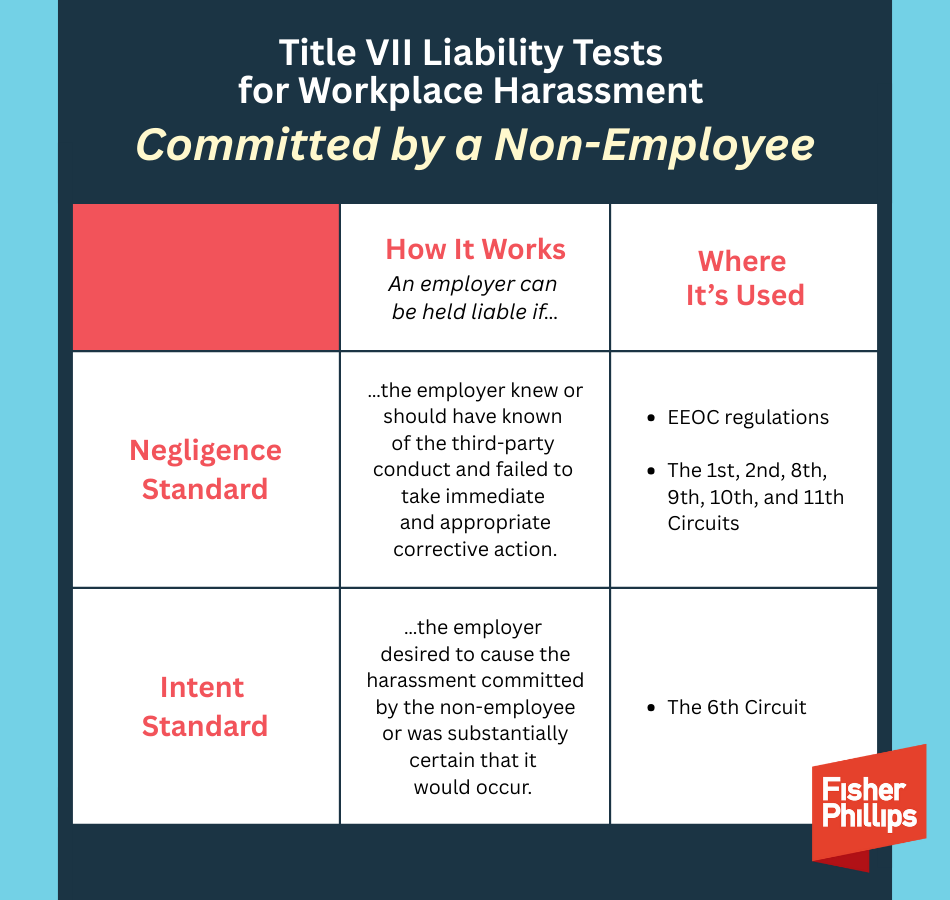Can an employer be held liable for workplace harassment committed by a non-employee? The short answer is “sometimes” – but a federal appeals court just significantly narrowed this liability risk for employers in Kentucky, Michigan, Ohio, and Tennessee. The 6th Circuit Court of Appeals recently held that Title VII requires intentional conduct by the employer before liability attaches based on the actions of a non-employee, such as a client or customer, and the August 8 holding marks a major departure from the negligence standard applied by most other federal courts and the Equal Employment Opportunity Commission (EEOC). We’ll explain what happened in Bivens v. Zep, Inc. and what it means for employers.
How It Started
- In 2021, Dorothy Bivens began working as a sales representative for Zep, Inc., a manufacturer and distributor of cleaning products for retail and commercial businesses. Her sales territory included the greater Detroit area.
- A few months later, Bivens visited one of Zep’s clients – a motel – and was allegedly sexually harassed by the motel manager during the meeting inside his office.
- Bivens described the incident to her supervisor, who then reassigned the motel client to another sales team so that Bivens would not have to interact with them again. Nobody else at Zep was made aware of the incident.
- Shortly after that, Zep terminated Bivens as part of a company-wide reduction in force (RIF) that resulted in a total of 23 employee determinations – decisions that were made by Zep’s president.
- Bivens filed suit against Zep in 2023 in a Michigan federal court.
The Lawsuit
Bivens claimed that Zep created a hostile work environment based on its client’s actions (the harassment incident at the motel manager’s office) and terminated her in retaliation for reporting such incident.
The district court ruled in favor of Zep on all claims, including those brought under Title VII of the Civil Rights Act of 1964 and Michigan’s Elliott-Larsen Civil Rights Act, and Bivens appealed. The 6th Circuit Court of Appeals recently affirmed, as discussed further below.
6th Circuit Adopts Intent-Based Standard
In an August 8 decision, the 6th Circuit held that an employer is liable under Title VII for a non-employee’s harassment of an employee only where the employer intends for the harassment to occur. Applying this intent standard, the court ruled that Bivens’ hostile-work-environment harassment claim failed. According to the 6th Circuit:
- An employer cannot be vicariously liable under Title VII for a non-employee’s actions (assuming that the individual is not an “agent” of the company who acts on the employer’s behalf and is subject to its control).
- Instead, employer liability for a non-employee’s actions attaches only if the employer is directly liable for those actions – and the intent standard, rather than a negligence standard, determines whether an employer is directly liable for workplace harassment committed by a non-employee.
- Under such intent standard, a plaintiff must provide evidence that that the employer either desired to cause the harassment committed by the non-employee or was substantially certain that it would occur.
- Bivens failed to show that Zep intended for the harassment committed by its motel client to occur. “Indeed, Zep is entirely absent from the timeline of this one-off event, even on Bivens's telling, until after she returned from the unfortunate sales call and reported it to her supervisor,” the court wrote. “Given as much, no jury could find that the company violated Title VII by intentionally treating Bivens worse based on sex.”
|
What About the Retaliation Claim? The appeals court held that Bivens’ retaliation claim also failed because she could not prove that Zep’s president, who made the decision to lay her off as part of the RIF, was aware of her complaint to her supervisor about the customer who sexually harassed her. |
A Clear Break From EEOC and Other Circuits
The Bivens court acknowledged that its adoption of the intent standard “departs from the conclusion reached by most circuit courts to have addressed the issue as well as the EEOC’s reading of Title VII.” According to the 6th Circuit:
- While EEOC regulations (29 C.F.R. § 1604.11(e)) say negligence is enough to hold an employer directly liable for workplace harassment committed by a non-employee, the agency’s interpretative authority over Title VII has “limited reach,” as it is authorized to issue only “procedural regulations.”
- Even if the EEOC had the authority to issue such regulations, the court was still required under Loper Bright – a landmark Supreme Court case decided last year – to independently interpret the statute.
- Based on the court’s independent review, Title VII imposes liability for non-employee harassment “only where the employer intends for the harassment to occur.”
- While most other circuits (including the 1st, 2nd, 8th, 9th, 10th, and 11th Circuits) have applied “some form of a negligence theory of liability to the harassing acts of customers” consistent with the EEOC guidelines, “there is no legal mechanism for imputing unlawful intent of a customer to a business he frequents.”
What Does This Mean for Employers Across the Country?
- For employers in Kentucky, Michigan, Ohio, and Tennessee, the 6th Circuit’s new intent-based standard offers greater protection against Title VII liability stemming from third-party conduct. This is especially beneficial for industries (such as retail, hospitality, or construction) where employees frequently interact with customers, clients, and other non-employees. You should continue, however, to take third-party harassment seriously and understand that this new intent standard is not the norm – especially if you have operations in other states – and is at odds with EEOC rules.
- For all other employers, Bivens serves as a good reminder of liability risks stemming from workplace sexual harassment committed by non-employees. According to the EEOC and most circuit courts, you could be held liable for such third-party conduct if you knew or should have known of the conduct and failed to take immediate and appropriate corrective action. Stay tuned, however, to see whether any other circuit courts adopt the intent-based standard, especially now that Loper Bright has shifted significant power from federal agencies to judges.
Conclusion
If you have any questions about your Title VII liability exposure related to third-party conduct, contact your Fisher Phillips attorney or the authors of this Insight. Make sure to sign up for Fisher Phillips Insights to stay up to speed on the latest developments.





